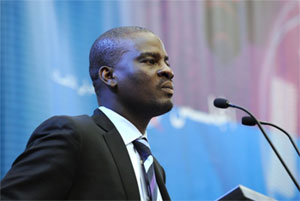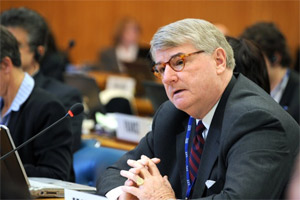|
Geneva, 13 April 2010 |
Not an official record |
N°1 |
|||||
|
Preparing for the Plenipotentiary India at the helm of Council 2010
Normally, there is a one-year interval between two sessions of the Council. However, because of the Plenipotentiary Conference, which will take place in Guadalajara, Mexico, from 4 to 22 October 2010 (PP-10), this year’s session had to start earlier, leaving just a little over five months for its preparation.
Highlighting the importance of information and communication technology (ICT) services and how they have improved and continue to improve our lives, Mr Jha commented that: “One can remain without food and water for a few days, but for a civilized society, it has become impossible to remain unconnected and uninformed, even for a single day.” He asked for the cooperation of all so that “significant decisions can be taken on the number of topics of serious concern for the success of ITU in the future”. Outgoing Chairman Iddrisu highlights outstanding business
The outgoing Chairman of the 2009 session, Haruna Iddrisu, Member of Parliament
and Minister of Communications of Ghana recalled the far-reaching decisions
taken last year, notably aimed at improving “the governance structure of the
Union to enhance the delivery of quality service and also encourage innovative
initiatives by the Management of the Union to the benefit of Member States”. He
commended all the Chairmen of the various Council Working Groups for dedicating
their time and resources to resolve what he described as "unfinished business"
from the 2009 session. The Council, he said, will be
updated on the progress made in the following subject areas, among others:
On staff matters, Mr Iddrisu commented that Council 2010 would see “the
collaboration between Management and the Staff Council, move to a higher
pedestal, following the resumption of formal dialogue, consultation mechanisms
and meetings between the Administration and Staff Council since Council 2009”.
This, he noted “is a pointer to the fact that Management and Staff Council have
heeded the call of Council 2009 to work together and promote peace and harmony
and work towards the attainment of the objectives of the Union. They have our
commendation”, Mr Iddrisu added. State of the Union address
Remembering Dr Pekka Tarjanne and
Poland's President Lech Kaczynski
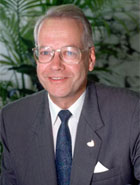 A minute of silence was observed to mark the sad and untimely passing of former
ITU Secretary-General Dr Pekka Tarjanne, who held office from November 1989 to
January 1999 and Poland's President Lech Kaczynski and his wife Maria, as well
as his entourage of senior officials,
who died in a tragic plane crash in Smolensk, in the Russian Federation, on 10
April 2010. A minute of silence was observed to mark the sad and untimely passing of former
ITU Secretary-General Dr Pekka Tarjanne, who held office from November 1989 to
January 1999 and Poland's President Lech Kaczynski and his wife Maria, as well
as his entourage of senior officials,
who died in a tragic plane crash in Smolensk, in the Russian Federation, on 10
April 2010.
Dr Touré described Dr Tarjanne as “a passionate believer in the power of ICT to change the world, and a leading advocate of the ‘Right to Communicate’ as a fundamental human right”. He added that "Dr Tarjanne was not only a tireless campaigner for ICT development and international cooperation, but a scientist who took a keen interest in the work of ITU in radio-frequency management and standards development." He recalled that "Dr Tarjanne presided over ITU during an era of unprecedented growth, and charted a sure and steady course for the organization through a period of immense change and upheaval." He then informed the Council that a Book of Condolences for Dr Tarjanne was open for signing, and would be sent to his family in Finland. 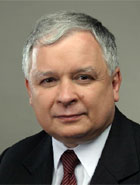 Dr Touré also expressed condolences to the Government and the People of Poland
on behalf of ITU. “This is a terrible event for Poland, and for all who know
Poland,” Dr Touré said. Dr Touré also expressed condolences to the Government and the People of Poland
on behalf of ITU. “This is a terrible event for Poland, and for all who know
Poland,” Dr Touré said.Dr Tarjanne was a close personal friend of many councillors, who all paid tribute to his huge contribution to the Union and also expressed their deep sorrow for Poland's national tragedy. The Polish Ambassador thanked the Council for the sympathy and solidarity it expressed towards the Polish delegation and nation. He said a Book Condolence was open at the Polish Permanent Mission for signing. Recent achievements and looking ahead
Dr Touré highlighted some of the recent achievements of our Union,
in particular the work to develop 3D TV standards, the universal
charger solution for mobile phones, as well as ITU's timely
interventions in restoring communications in the aftermath of the
devastating earthquakes in Haiti and Chile, and the mudslides
in Uganda between January and March 2010. Looking ahead, he
emphasized the importance of WTDC-10 for PP-10 . A number of
Regional Preparatory Meetings have been held around the world to
provide inputs on strategies and priorities to WTDC-10. "The
Conference will adopt a declaration and an action plan that will
pave the way to building on the foundations of a truly global
information society," Dr Touré said.A broadband future
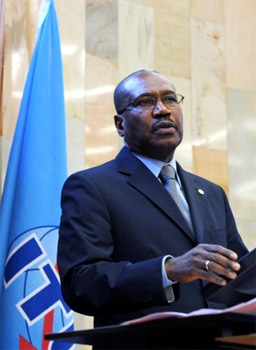 Dr
Touré informed the Council that ITU and the United Nations Educational,
Scientific and Cultural Organization (UNESCO) were in the process of
establishing a Broadband Commission for Digital Development. The commission will be
chaired by President Paul Kagame of Rwanda, with the Director-General of UNESCO
Irina Bokova and Dr Touré holding the vice-chairmanship. The commission has the
full backing of the United Nations Secretary-General, and will report to the
2010 MDG Summit later this year in September. The commission complements ITU’s
own ‘Build on Broadband’ campaign, launched in January 2010 to increase
awareness on the vital role broadband will play in the 21st century. The
Secretary-General underlined that with this campaign, ITU had taken the lead in
getting ICT back into the mainstream of the mandate of the United Nations and
its specialized agencies. Dr
Touré informed the Council that ITU and the United Nations Educational,
Scientific and Cultural Organization (UNESCO) were in the process of
establishing a Broadband Commission for Digital Development. The commission will be
chaired by President Paul Kagame of Rwanda, with the Director-General of UNESCO
Irina Bokova and Dr Touré holding the vice-chairmanship. The commission has the
full backing of the United Nations Secretary-General, and will report to the
2010 MDG Summit later this year in September. The commission complements ITU’s
own ‘Build on Broadband’ campaign, launched in January 2010 to increase
awareness on the vital role broadband will play in the 21st century. The
Secretary-General underlined that with this campaign, ITU had taken the lead in
getting ICT back into the mainstream of the mandate of the United Nations and
its specialized agencies.Shaping the agenda of PP-10
Dr Touré suggested the holding of a High-Level Segment (HLS) dedicated to “Our
Shared Broadband Future”, on the opening day of the
Plenipotentiary Conference.
HLS would bring together Heads of State and CEOs from ITU Sector Members to
share their vision for the future of ICT and broadband Internet.
He also called for more stable and predictable funding mechanisms for the future of the Union. Dr Touré said that “with the implementation of new systems, such as IPSAS, we now have the necessary transparency and discipline to achieve this”. He expressed the hope that with better reporting mechanisms, Member States will be convinced that supporting ITU’s work is good value for money. And as the world moves out of the financial crisis, he hoped that Member States will consider increasing their contributions to ITU. 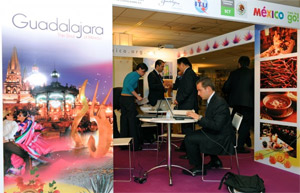 PP-10
should take steps towards stabilizing the basic texts of the Union,
with a view to creating durable texts that do not require frequent
amendment by Member States, the Secretary-General underlined. PP-10
should take steps towards stabilizing the basic texts of the Union,
with a view to creating durable texts that do not require frequent
amendment by Member States, the Secretary-General underlined.Member States should work together with the secretariat to increase Sector membership and broaden and strengthen the Union. “As a market-responsive organization in a fast-changing environment, we need to work constantly to continue to increase our relevance,” Dr Touré told the Council. “We must attract and welcome new members from all branches of ICT while retaining existing members,” he stressed. Another key question on which PP-10 should ponder is whether the membership categories – which go back to 1998 and beyond – are still relevant and appropriate in today’s world. "In a world with close to five billion mobile cellular subscriptions and two billion Internet users, perhaps we can simplify things for prospective members" Dr Touré noted, calling on the Council to explore this issue “taking into account the complex needs of different constituencies”. The Secretary-General’s State of the Union address was well received. Saudi Arabia described it as “convincing and complete”. Tanzania commended ITU for its efforts on emergency telecommunication assistance to Haiti, Uganda, Chile and the rest of the world. The Secretary-General was commended for raising the visibility of the Union on the international scene. Pakistan, Malaysia and Algeria liked its focus on broadband, with Algeria saying that they would participate in boosting broadband through the Commission. Draft Report of Council on the activities of the Union for the period 2007-2010
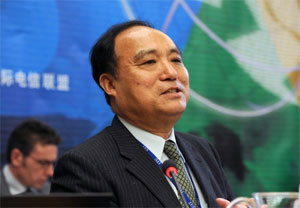 ITU Deputy Secretary-General presented Document C10/35 on the
activities of the Union since the last Plenipotentiary
Conference in Antalya, Turkey, in 2006. The report covers the
period 2007-2010, as well as ITU TELECOM WORLD
2006, which took place in Hong Kong, China, in December
2006. It highlights the main activities and
accomplishments, as well as progress in achieving the
implementation of the seven Strategic Goals of the Union for
2008-2011, Mr Zhao said. ITU Deputy Secretary-General presented Document C10/35 on the
activities of the Union since the last Plenipotentiary
Conference in Antalya, Turkey, in 2006. The report covers the
period 2007-2010, as well as ITU TELECOM WORLD
2006, which took place in Hong Kong, China, in December
2006. It highlights the main activities and
accomplishments, as well as progress in achieving the
implementation of the seven Strategic Goals of the Union for
2008-2011, Mr Zhao said.The report is structured in five parts as follows:
France thanked the Deputy
Secretary-General and the secretariat for what he called “a thorough
report organized around the seven strategic goals”, adding that it will
be a very useful document for developing the future strategic plan. Malaysia sought to know the views of the secretariat on the proliferation of working groups, which take rather long to complete their work, according to that delegation. The delegation also suggested that these groups should only be set up when absolutely necessary, underlining that critical decisions have to be taken quickly and that these groups are very expensive and not many countries can take part in them and are, therefore, left out from decision-making. Conclusion on the activities report
The Council approved Parts 1 and 2 of the
report, subject to revision, as appropriate, in the light of
the work to be carried out during this session and by the
Council Working Groups in June 2010.
Part 5 was noted, and would be published as a separate document.
Implementation of the Strategic Plan for 2008-2011
Alex Ntoko of the General Secretariat presented Part 3 of
Document C10/35 on the implementation of the Strategic Plan for
2008-2011. This report is complemented by information on the
work carried out by the Performance Measuring/Reporting (PMR)
Group, which was endorsed by the Council in 2008.
Bulgaria asked to see simple wording on the financial results of each TELECOM event. He underlined the importance to reflect concisely the income or loss of income of all TELECOM events mentioned in the report. The secretariat responded that it would be able to include this information before sending the report to PP-10. In accordance with past practice, the Chairman proposed that the report on the activities of the Union should be finalized under his supervision, and with the assistance of the secretariat. Strategic and financial plans for 2012-2015
Fabio Bigi, Chairman of the Council Working Group for the elaboration of
the draft Strategic Plan and the draft Financial Plan for the Union for
2012-2015 presented the group’s preliminary report (see
Document C10/20 and
its Addendum 1). The group held three meetings, and has produced the
draft Strategic Plan (see
Annex 1 to Document C10/20), based on inputs
by the secretariat and Member States, and reflecting agreed inputs from
the Sector Advisory Groups, namely: the Radiocommunication Advisory
Group (RAG), the Telecommunication Standardization Advisory Group (TSAG)
and the Telecommunication Development Advisory Group (TDAG).
Mr Bigi underlined that the section in the plan corresponding to ITU’s Telecommunication Development Sector (ITU-D) was provisional and subject to change after the fifth World Telecommunication Development Conference (WTDC-10), which ends on 4 June (one day before the deadline that had been set by the Council for posting the draft Strategic Plan). Due to these timing issues, flexibility for ITU-D is necessary to take into account the results of WTDC-10, notably the programmes and initiatives it will approve for the regions for the next four years. To this end, he presented a draft Resolution proposing to extend the working period of the group beyond Council 2010 (see Annex 2 to Document C10/20). The Plenary agreed that a fourth meeting of the group should take place on Wednesday, 14 April 2010. The draft Strategic Plan would be reviewed again in Plenary, possibly in the course of next week. Draft Financial Plan for the Union 2012-2015
Current projections in the draft Financial Plan
indicate a shortfall of CHF 31 million. The group was
looking to the Council for general guidance and input on how to address
this shortfall. The following planning parameters and main assumptions
agreed by the Management and Budget Group (MBG) were used in drawing up
the plan:
Comments from the floor
Bruce Gracie, Chairman of the Council Group on the Financial Regulations and Related Financial Management
Issues (FINREGS), underlined the need to establish
linkages between the strategic plan and the budget structure going
forward. “We should consider merging decisions 5 and 6 from Antalya, given that we
were unable to reach agreement on a financial plan in Antalya,” Mr
Gracie said. He proposed that the FINREGS group should meet on 15 June,
review elements of the Financial Plan and provide input to Mr Bigi’s
group for discussion on 16 June 2010.
Dr Touré also recalling that “we came from Antalya without financial plan” stressed that this should not happen at PP-10, with a balanced plan. “We are returning good money every time to the Reserve Account”, he said adding that he will continue visiting countries and satellite super powers, who also realize that their level of contributions does not reflect their financial strength. He noted that there may be gaps now… but that the picture would be clearer closer to PP-10. “ We were able to balance the budget in 2007 without any problem, and in record time in 2009. So we should be able to do the same before the conference,” Dr Touré said. Germany stressed the need to have “a paper with concrete goals” and that reflects “where we want to be five years from now”. The United States supported this view, as well as Mr Gracie’s comments, adding that there was no time to finish the review in RAG. He also emphasized the need to look for concrete measures to reduce the gap in the draft financial plan. “We do not want to see the Reserve Account as a way of balancing the budget… it is not a long-term sustainable option,” the United States commented. The councillor expressed support for the efforts being made by the Secretary-General to put the Union on a sustainable path. Malaysia noted that key performance indicators were already being used by the group as a way forward to a clear strategic plan. Switzerland, underlining the importance of tabling a balanced budget at PP-10, noted that we should not underestimate the issue of how we manage our spending. “We laud the efforts of the Secretary-General, but we must look at other measures and set priorities. Dipping into our Reserve Account should not be a habit, but must be an emergency,” the Swiss delegate said, adding that we should look at using real zero growth as opposed to zero nominal growth. 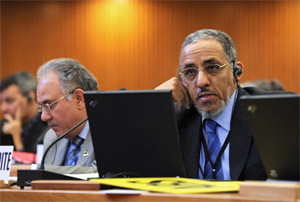 Saudi Arabia, echoing the sentiments of previous speakers said that the
draft plan “is a working document”. Indonesia called for the
strengthening of regional offices to better meet the needs of the
regions. Bulgaria underlined three things: the need for a balanced
budget, the linkages between all three plans (i.e. the Strategic Plan,
the Financial Plan and the Operational plans of the three ITU Sectors
and the General Secretariat), and how do we cope with the economic and
financial crisis, which might last a long time? Bulgaria also expressed
appreciation for the Secretary-General’s efforts to have a balanced
budget. Saudi Arabia, echoing the sentiments of previous speakers said that the
draft plan “is a working document”. Indonesia called for the
strengthening of regional offices to better meet the needs of the
regions. Bulgaria underlined three things: the need for a balanced
budget, the linkages between all three plans (i.e. the Strategic Plan,
the Financial Plan and the Operational plans of the three ITU Sectors
and the General Secretariat), and how do we cope with the economic and
financial crisis, which might last a long time? Bulgaria also expressed
appreciation for the Secretary-General’s efforts to have a balanced
budget. Noting that 80 per cent of the budget is staff cost, Bulgaria said that the secretariat should provide the Council with the percentage of staff in the General Services and Professional categories. “Now, with computers, is the ratio still needed?” the councillor queried, adding that staff should be made more efficient and adapted to the environment. He said that the establishment of a redundancy fund would help deal with some of these issues, and emphasized that “we should use the Reserve Account very rarely”. Mr Bigi stated that the plan was still at an early stage and that it is up to members to decide the priorities to be featured in it, adding that he would be happy to hold another meeting of the group on the Elaboration of the Strategic and Financial Plans during this session of the Council. Management and Budget Group
The Council noted the report of the Management and Budget Group
presented by its Chairman Mr Jha (now Council Chairman). MBG has the
mandate, inter alia, to provide advice and guidance to the elected
officials regarding the implementation of the strategic and operational
plans. At its meeting in February 2010, MBG considered reports from
FINREGS, the group on the Elaboration of the Strategic and Financial
Plans, and from the Tripartite Group on Human Resources Management. It
also reviewed issues related to linking strategic, financial and
operational planning. Mexico, which now holds the vice-chairmanship of
the Council, takes over the chairmanship of MBG. |
|||||||


